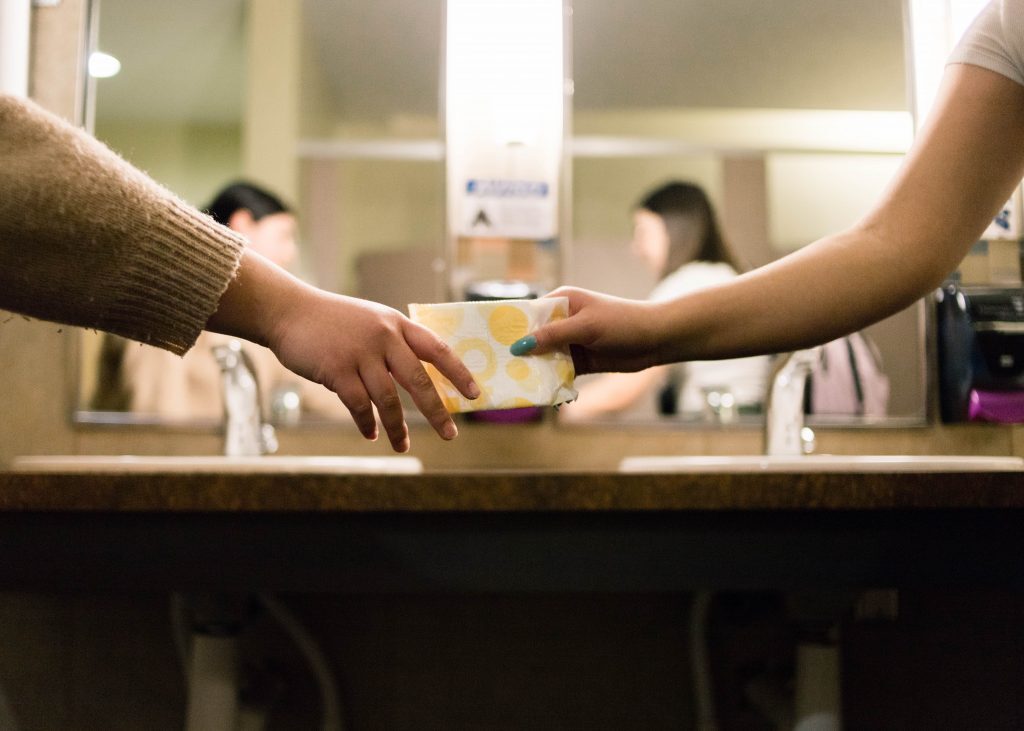Supressing stigma about menstruation

Working women, activists and teachers in India have been rallying for period leave in workplaces (Photo: Annika Gordon)
Zomato’s announcement of introducing period leave is not the first time the conversation has come up. Bihar has allowed female government employees two days off each month since 1992, and although lesser-known organisations like Cultural Machine and Gozoop had taken this step previously, Zomato was the first high-profile company to do so, with founder and CEO Deepinder Goyal saying the organisation wanted to “foster a culture of trust, truth and acceptance.”
“The issue is many do not think it’s a big deal. Even if we have an employer who is open enough to discuss this issue, the main problem is they won’t take you seriously. A big company like Zomato making such a move will hopefully pave the path for more companies to follow suit,” says Namrata Nair, a 28-year-old Delhi resident who works in marketing.
In fact, a severe lack of awareness around the subject is what sets a dangerous precedent and results in harmful assumptions around women’s health, according to working women like Nair and experts who work for women’s issues in India.
“People experience menstruation differently, and their experiences can also vary during different times of their lives. However, lack of attention to and education and research about menstruation has led to a situation where many women and girls around the world, including in India, continue to experience stigma and may suffer from menstruation-related disorders, without receiving information or care,” Anju Pandey, a project coordinator at United Nations Women in India, tells Media India Group.
UN Women is the United Nations entity that works with governments and civil society to design laws, policies and programmes dedicated to ensuring gender equality and the empowerment of women.
“Women must be able to make informed choices about how to manage their menstruation and how to access care and support when they need it, and systems and institutions should provide for and enable such care and support. We can learn from women’s experiences in different sectors, private or public, about what works and what doesn’t, and shape policies and actions based on the lived experiences of women and girls,” Pandey explains.

Women fear long-term side effects of constant use of OTC medications like painkillers, and birth control (Photo: Jonathan Borba)
Nair believes that while there are ways women deal with pain and illness during menstruation, these should be seen a last resort and cannot count as long-term or everyday solutions. Moreover, she explains how they must be used because of a woman’s choice rather than society’s expectations or toxic hustle culture.
“There are times where I literally can’t get out of bed because my body is paining so much. Some of my friends barely feel it, but I know other girls who vomit from the pain, so it’s not one-size fits all. If I’m forced to be at work, I have to take painkillers and over time, that can result in ulcers or increased tolerance, which is dangerous. Young girls especially don’t realise that birth control medications have these side effects like weight gain, hormonal issues, fertility problems later in life. It’s like that’s a new problem on top of already going through the discomfort of periods just because the world can’t adjust,” says Nair.
Zomato’s decision was lauded by numerous women’s rights activists and social media users. For example, Lavanya Ballal, social media coordinator for the Congress party, wrote on Twitter, “Most women take pain killers and continue working. Some women find it extremely difficult to work during periods. This won’t take away from the hard won space that women have gained.”
There have also been outspoken advocates against offering such leave, who say it is “anti-feminist” and pushes the narrative that women are the “weaker gender.” Many Indian women are also worried that in a world where hiring managers are already wary of hiring women due to maternity leave, this would negatively affect their hiring chances, worsen the pay gap or push them out of decision-making roles in office. Rather than being beneficial, it could be seen as asking for “special treatment” and so could eventually ruin the progress women have made towards equality in the workplace.
“Sorry Zomato, as woke as your decision on #PeriodLeave is, this is exactly what ghettoizes women and strengthens biological determinism. We cannot want to join the infantry, report war, fly fighter jets, go into space, want no exceptionalism and want period leave,” Barkha Dutt, one of the most prominent female journalists in India, tweeted.
However, young working women like Nair believe that companies should make the effort to empathise rather than asking women to labour through their pain simply to prove a point.
“It is disappointing when someone as influential as Barkha Dutt makes that kind of statement because there are many people who look up to her. She paved the way, so why is she gatekeeping it? I understand where she’s coming from, because she has fought hard to make her mark in a man’s world, since the journalism and reporting industry was very male-dominated, so I see why she started to look at her own problems through male gaze. But we should look at the situation from our point of view, not only our employer’s point of view, and not be belittled for something that’s so natural,” explains Nair.
“Also, I think the pandemic has literally proven that you can work from home at the same level of productivity, and it doesn’t matter if you don’t come to office some days. Those adjustments can also be made by companies if women are too unwell to come in,” she adds.
Regardless of differing feminist perspectives, these discussions have undoubtedly helped bring a taboo topic into mainstream conversation. Zomato’s CEO also said that “There shouldn’t be any shame or stigma attached to applying for a period leave,” which is often the case even in the corporate world.
According to Pandey, one of the key projects that UN Women focuses on in India is period poverty, which is severe in rural communities and is an issue often exacerbated by the persistent stigma around menstruation in Indian society. According to UNICEF data, a quarter of all girls in school took time off during their periods because of the inability to access gender-specific toilets or safe sanitary products, which eventually translates to lost economic opportunities for women workers.
“Some Gram Panchayats (village councils) have started celebrating “Chuppi Todo Diwas” (Break the Silence Day), to raise awareness about menstrual hygiene and also provide health check-ups. The debates around menstrual hygiene management issues break the silence that shrouded the issue, and which has for decades perpetuated lack of awareness, lack of safe access to and disposal of adequate menstrual hygiene products, and an abundance of myths,” says Pandey.









